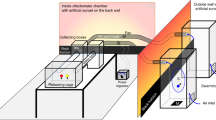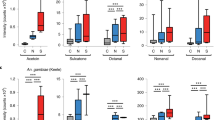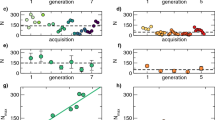Abstract
THE study of the biology of the European Anopheles, particularly the complex of forms known as Anopheles maculipennis, has been greatly hampered by the difficulty of inducing mating under laboratory conditions. Missiroli and I1 have given a summary of the experiments made with these mosquitoes, of which only the race known as atroparvus has mated in captivity. In this form, it appears that there is no sexual dance on the part of the males as a preliminary to mating. Curiously enough, females of all the races will mate with atroparvus males, but repeated attempts on the part of many investigators to get them to pair with males of their own kind have failed.
This is a preview of subscription content, access via your institution
Access options
Subscribe to this journal
Receive 51 print issues and online access
$199.00 per year
only $3.90 per issue
Buy this article
- Purchase on Springer Link
- Instant access to full article PDF
Prices may be subject to local taxes which are calculated during checkout
Similar content being viewed by others
References
Rivista di Malariologia, 14, 45 (1935).
Author information
Authors and Affiliations
Rights and permissions
About this article
Cite this article
HACKETT, L., BATES, M. Swarming of the Males of Certain European Anophelines in Captivity. Nature 138, 506–507 (1936). https://doi.org/10.1038/138506b0
Issue Date:
DOI: https://doi.org/10.1038/138506b0
This article is cited by
-
Versuche zur Orientierung der Stechm�cken: die Schwarmbildung und die Bedeutung des Johnstonschen Organs
Zeitschrift f�r Vergleichende Physiologie (1958)
Comments
By submitting a comment you agree to abide by our Terms and Community Guidelines. If you find something abusive or that does not comply with our terms or guidelines please flag it as inappropriate.



